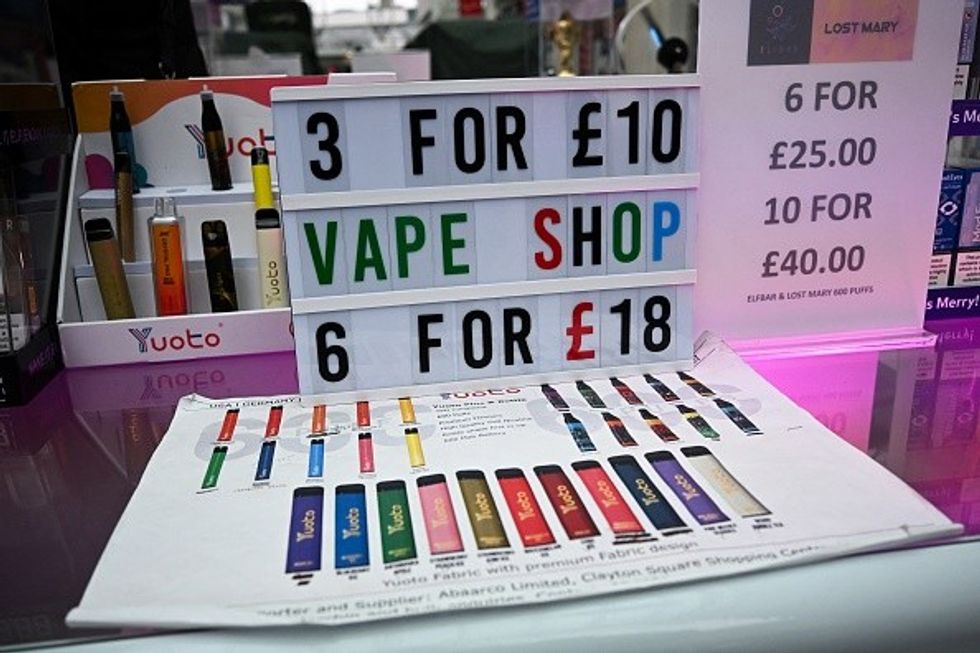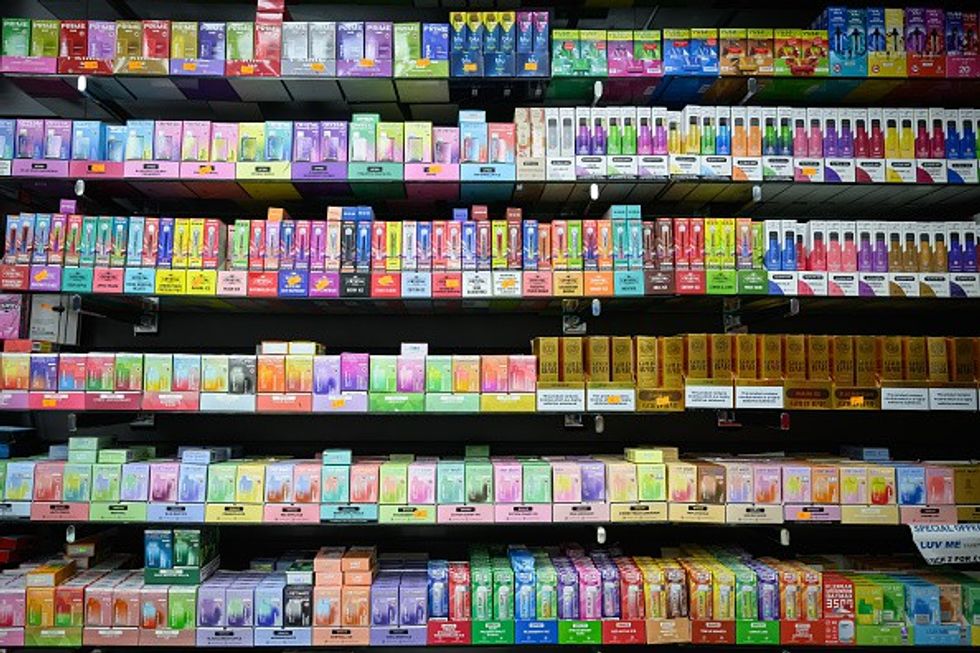As the UK government prepares to outlaw disposable vapes from June 1, a cloud of confusion and frustration hangs heavily over the independent retail sector.
While the government cites youth vaping and electronic waste as the driving forces behind the ban, retailers on the ground are raising the alarm.
From June 1, those found selling disposable vapes will receive a £200 on-the-spot fine in the first instance, rising to an unlimited fine and/or a prison sentence of up to two years for repeat offences.
The ban specifically applies to vape devices that are neither rechargeable nor refillable. Household names such as the Elf Bar 600 and Lost Mary BM600 fall under this category and will be illegal to sell.
The motivation behind the ban is understandable. Considering that five million disposable vapes, containing lithium-ion batteries, are discarded each week in the UK, and many of them not disposed of properly, some kind of actions on proper disposal were badly needed for a long time.
But the solution rolled out is raising more questions than answers.
For convenience retailers, the ban feels less like a policy for public good and more like a “strategically targeted attack” on an already embattled sector on multiple fronts right from basics like loss of high-margin product line to implementation complications, loss of loyal customers, backlash from abusive customers and expected rise in illegal trade in the community.
Echoing the views of the convenience sector, Manchester-based retailer Priyesh Vekaria spoke at length with Asian Trader, highlighting the critical risks associated with the disposable vape ban and its potential pitfalls.
“This seems like a half-baked legislation. It's almost as if somebody came upon a vague idea, made a note of it and presented it in the Parliament.
"Ultimately, it will be us retailers who will be facing the hardships in implementing this ban."
Reusable devices, such as pod-based and refillable kits, remain legal.
A recent study by University College London (UCL) study even claims that popularity of disposable vapes has fallen, mainly due to vape users switching to refillable and rechargeable ones in anticipation of the ban.
While most retailers have been educating and shifting their customers towards reusable options, lack of clarity still persists.
Citing an example, Vekaria revealed how in some cases, vape makers have gone ahead to quickly transition disposable vapes into rechargeable ones by simply adding a battery pod, making it tricky for retailers to identify the compliant devices.
Illicit trade or an albatross around the neck?
Ironically, who are not going to suffer here and rather flourish post June 1 will be rogue traders and suppliers.
Black market is already booming with illegal vapes at the moment. The scale of illegal vape market can be estimated by the fact that more than six million illegal vaping products were seized by Trading Standards officers across England in the past three years.
However, this is just the tip of the iceberg.
Currently, any vape with tank sizes greater than 2ml, a nicotine strength of more than 20ml or labels that do not display manufacturer details and health warnings is considered “illegal vapes”. From June 1, disposable vapes will also become illegal.
Talking about the users' behaviour, a recent survey by Haypp shows that almost a third (32 per cent) of those surveyed admitted they would be willing to purchase an illegal vape. So certainly no problems there!
With patchy enforcement and steady demand, legitimate shopkeepers are now bracing for a fresh wave of illicit trade that would threaten both their livelihoods and community safety.
Venkaria stated:
“The government is bringing a new piece of legislation while it is already failing to tackle the current booming illegal vape trade.
"The June 1 ban will need even stronger enforcement, but does Trading Standard has enough resources?"

Recently, in Solihull in Midlands, the biggest seizure of illegal vapes from retail was reported in March this year. Within a few days, the store in question was open again for trading, Vekaria pointed out.
“The enforcement is clearly not powerful enough to deter the illicit trade.
"Also, there is so much money in this, that the rogue traders can afford to pay whatever the fine is and then carry on doing illegal business."
Retailers like Vekaria are not only bracing for the new legislative burden, but they also fear a significant loss of basket spend.
“When a store is in a highly-competitive high street with all sorts of businesses, customers are likely to choose stores that sell them whatever they ask for; buyers won’t care much about the legalities since they are used to disposable vapes.
“We will not only lose some customers but also their basket spends, repeat visits and loyalty,” he said. “If someone around the corner is selling disposables, albeit illegally and without any consequences, why would customers come to me?”
Vekaria’s fears are not completely baseless.
National Crime Agency (NCA) has recently launched the crackdown, called Operation Machinize, in response to growing intelligence reports that some of the small businesses are used for illicit importation of tobacco, vapes and firearms.
Such premises, often Turkish-style barbers, vape shops and mini-marts, are suspected of being fronts for international crime gangs with rampant money laundering.
Clearly, the supply line, logistics, traders as well as buyers are well in place. Come June 1, single-use vapes are expected to join the mix with their distribution likely rerouted into the same black-market channels that already traffic high-nicotine devices and illicit tobacco.
No wonder, retailers' bodies are also concerned and are on high alert.
Sharing his thoughts on the ban, Andrew Goodacre, BIRA chief, told Asian Trader:
“Recent news reports have already highlighted a large black market for illegal vapes in the UK, often being sold through small shops, barbers, etc.
“The ban on disposable is likely to make the black market even more attractive and could equally open up on-line opportunities for the criminals selling these products.”
“Whether it is the sale of disposable vapes, or the sale of knives, the real problems seem to exist on-line where historically there has been a lack of concerns shown by the owners of online marketplaces.
“There is no doubt that the bans of products will create a larger black market, and we hope that trading standards receive funding to address any issues.”
Convenience store owners' association echoes similar concerns, raising the alarm that rogue businesses will take advantage of the lack of Trading Standards capacity and continue to sell disposables.
Chris Noce from ACS told Asian Trader:
“We have consistently called for Trading Standards to be provided with additional resources and funding to deal with the illicit trade, and we urge retailers who see illicit activity in their area to report it.
"There is already a significant illicit trade in vapes, and there’s the potential for a lot of confusion after June 1 if communication about the ban isn’t clear.
“We urge retailers to follow our guidance on what to look out for, not just on disposables vs rechargeables, but on spotting any illicit product in the category.”

In Scotland, the situation is no better.
According to the Scottish Grocers’ Federation (SGF), there is already a significant market for illicit vapes in Scotland and across the UK.
SGF fears that compliant and well-meaning local businesses will end up losing custom and footfall, while at the same time the ban would incentivise non-compliant operators and rogue traders to increase their supply.
Dr Pete Cheema OBE, SGF chief executive, told Asian Trader:
"We have also called for an uplift in support for Trading Standards to cope with the impact of the ban in Scotland.
"The Tobacco and Vapes Bill, currently proceeding through the UK Parliament, will see an additional £30 million for Trading Standards south of the border, but we have yet to see the same commitment from Scottish Ministers."
Meanwhile, ACS, along with other industry bodies such as SGF, has issued guidance to help retailers distinguish between legal and illegal products but ultimately, the responsibility lies with the individual store.
Trading Standards’ firm stand
On the other hand, Trading Standards continue to remain firm on their ground and confident that they will be able to support the ban implementation.
To help the implementation of the sea of upcoming restrictions, a new £10 million boost for Trading Standards has been launched recently that will fund an expected 80 more apprentice enforcement officers to stop harmful tobacco and vape products finding their way into neighbourhood shops.
Alongside this, the new vaping duty (which will come into force in 2026) will introduce new civil and criminal powers, giving them the ability to seize products and recruit over 200 additional compliance staff.
Kate Pike, Chartered Trading Standards Institute Lead Officer for Tobacco and Vaping, has assured Asian Trader that Trading Standard has substantial support after the government's recent boost.
Pike shared with Asian Trader:
“We are already seeing new apprentices starting to join us across the country and we have a substantial increase in funding for storage and recycling to support us when we seize illegal products.
“We will continue to take action against those who sell illegal vapes whether disposable or any other type – we have extra tools in our toolkits now but retain the full range of sanctions and penalties also,” she said.
She, however, denies any spike in illegal vape trade.
“I am not sure there is a spike in illegal vapes. I think we have had issues with illegal vapes since the disposables started coming in a few years ago but we are starting to get things under control with the work we have been doing inland as well at ports and borders.
“We also asked for vapes to become an excise product in order to bring in the enforcement strength of HMRC and Border Force and Government responded by confirming that Vaping Products Duty will be introduced on all products supplied in the UK from October 2026.
“In the meantime, the investment from government in Trading Standards will allow us to continue working to tackle illegal vapes inland and at border points."
Urging the retailers to start clearing out disposable vape stocks now, Pike warned that possessing or selling even a single product after June 1 will be a criminal offence.
Adding that alternatives are now widely available, she has been reminding retailers of their legal duty to offer vape take-back services, regardless of volume sold.
Wake-up call, 'Control the controllable'
As the date inches to June 1, calls are being raised for the government to take actions in the form of awareness and support to retailers who will be implementing the ban.
As pointed out by Noice from ACS, the most helpful support from the government at this stage in terms of awareness will be to communicate clearly to the public about the ban.
“What we need is for government to prioritise enforcement in communities across the country, and it can only do that by bolstering Trading Standards teams and following up on local reports of illicit activity.”
Dr Cheema from SGF is calling for more public awareness about the ban, in light of the impacts and consequences of purchasing illicit goods.
“This should be delivered alongside accessible guidance for retailers about the changes and how to comply.
“Retailers are already facing unprecedented levels of abuse and anti-social behaviour in store. This is often at its worst when they refuse a sale over the counter.
“It should not be the role of retailers to deliver government public policy messaging on why products are no longer available to customers. So there must be a smooth transition to reduce any further escalation in retail crime,” Dr Cheema said.
Interestingly, even some of the largest vape manufacturers are uneasy. Joining the call is Elfbar, one of the UK’s most-used vaping brands among adults for smoking cessation.
The brand has written to the government, asking for robust enforcement and coordinated public messaging.
According to Eve Peters, director of government affairs for Elfbar in the UK, here remains a lack of awareness and understanding of the pending changes, particularly among consumers.
Recent research found that 30 per cent of UK residents did not know that single-use vapes will be banned from 1 June 2025, pointed out Peters.
Elfbar also supports calls from representatives in the UK sector for a retail licensing scheme for vapes, modeled on the Licensing Act 2003 which governs alcohol sales.
The licensing scheme is also getting the backing of vaping trade association UKVIA.
The ban on disposable vapes will in fact put children at greater risk by turbo-charging the black market and, in turn, making it easier for them to access illicit and non-compliant vapes, stated the body.
The body also stated that the answer to youth vaping doesn’t lie in counterproductive bans and restrictions, but rather in effective and proactive enforcement, which is woefully lacking, of the law which states that it is illegal for vapes to be sold to minors.
UKVIA has been part of a major industry-wide consultation over the last couple of months that has led to the development of a vape retailer and distributor licensing scheme to make it harder for the rogue traders to get away with underage and illicit sales, stated the body.

Licensing scheme, as proposed in the Tobacco and Vapes Bill, is finding support among convenience retailers as well.
Sharing his thoughts on the licensing scheme, retailer Vekaria said,
“Licensing scheme for vapes is one of the solutions we would like to see.
"Retailers will encourage and support licensing scheme to ensure that illegal trade can be tackled more effectively."
Vekaria meanwhile is calling on fellow retailers to reach out to their local MPs and voice their concerns, thus making them aware of the ground realities.
"We can’t do everything but we can control the controllable. And our controllable as of now is to let MPs know the loopholes and implementation difficulties.”
Vekaria, who attended a Parliamentary Reception at the House of Commons recently along with fellow leading retailers like Neil Godhania and Nila Patel, was disheartened with the government attitude towards the sector.
"While the turnout of MPs was very poor, the message from them was vague, showing their ignorance of the ground realities of the issue.”
Alongside the ban on disposable vapes, Vekaria feels it is also the right time to warn MPs about the implications of another legislation coming their way, that is the Tobacco and Vapes Bill’s highly complicated generational smoking ban.
“I think maybe we can leverage some guidance to at this stage. Instead of age limit changing every year, if age restrictions can be shifted more periodically like first at 25 years, then 30 and so on, it will be more manageable for us.
“The law in the present form is a perfect soup for conflict, confusion and chaos, while retailers will be left alone to handle in their communities.”
Be it disposable vape ban or generational smoking ban that will hit the retailers in 2027 (if it comes into effect), the onus always tends to fall on the retailers on the ground for the grass root implementation.
“Our job is increasingly becoming educating the consumers on what is good for them and what is not.
"It is us who often end up facing the backlash of the customers. The conflict is only going to spike in the coming months.
“And now the question arises if they're going to do this with tobacco and vaping products, how long before they do this to alcohol?”
“There is lots of fear among us that if this goes through, it will open the floodgate for other age-related products to fall under such scrutiny and enforcement implementation,” Vekaria said.
As June 1 inches nearer, convenience retailers are busy clearing their stock of disposable vapes. While most are diligently prepping up to comply with the ban, the harsh reality is that the streets won’t stay vape-free for long.
Without strong enforcement, disposable vapes will simply shift from the legal to the illegal, fueling a black market already in overdrive. Rogue traders will sell what law-abiding retailers no longer can.
Unless there is loud and clear public messaging, robust education, stronger enforcement, and visible unwavering support for retailers, it seems that the ban on disposable vapes is unlikely to make a meaningful dent in the real problems.

![Disposable vape ban: Policy without policing? [Exclusive]](https://www.asiantrader.biz/media-library/image.jpg?id=60262272&width=1200&height=800&quality=60&coordinates=0%2C0%2C0%2C0)
